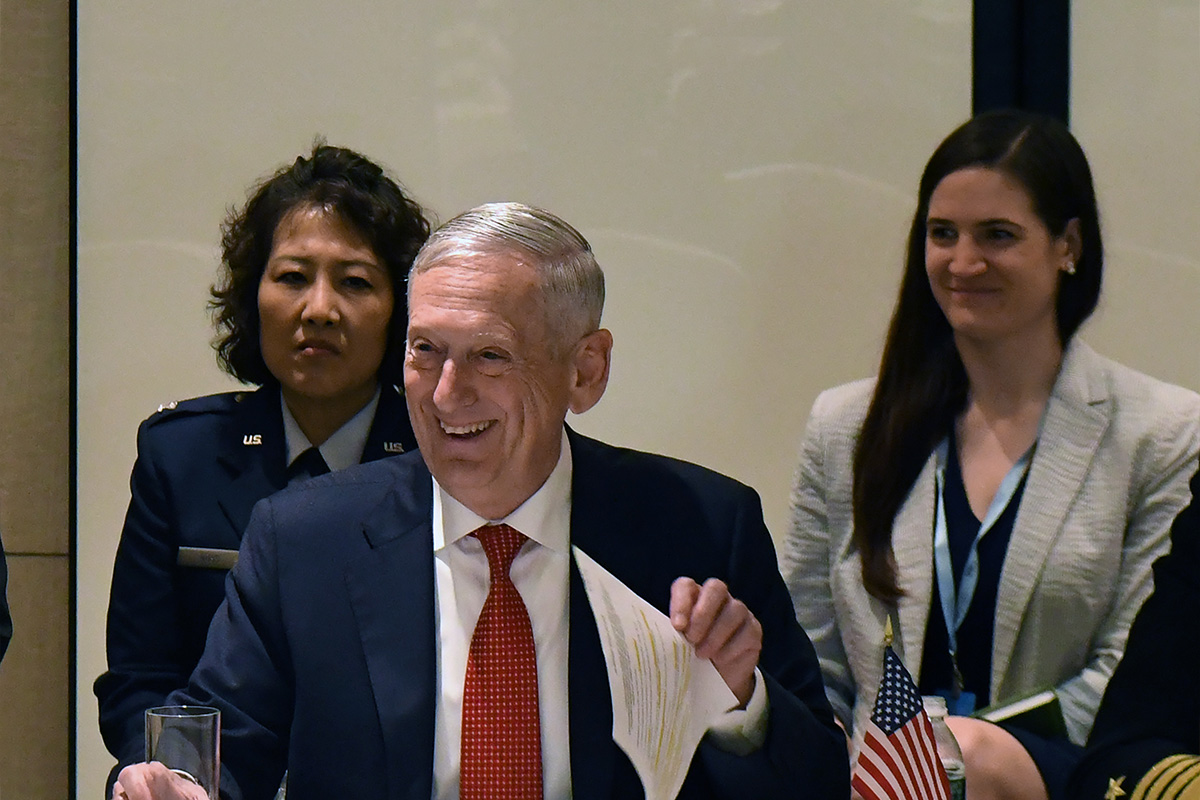United States (US) Secretary of Defense James Mattis said the world would have to deal with China’s militarisation of the South China Sea for now, but that Beijing would face “larger consequences” in the long term that could persuade it to change track.
Beijing’s deployments of missile batteries and bombers to outposts in disputed areas appear aimed at intimidating neighbours, Mattis told delegates on Saturday at the International Institute for Strategic Studies (IISS) Shangri-La Dialogue in Singapore. The defense secretary said such moves had caused the US to reconsider its “cooperative stance” and disinvite China from the world’s largest annual naval exercise later this month.
Mattis acknowledged that was a relatively small penalty for China to pay, and that the region would be “dealing with the reality” of its territorial claims over a vital global shipping route.
“I believe there are much larger consequences in the future, when nations lose the rapport of their neighbours,” Mattis said after his speech in response to a question from the media. He also attacked what he said were excessive loans made under China’s Belt and Road Initiative that were binding smaller nations in debt.
“Eventually these things do not pay off, even if on the financial ledger sheet, or the power ledger sheet they appear to,” he said. “It’s a very shaky foundation when we believe that militarising features are somehow going to endorse their standing in the world.”
Long-running disputes between the world’s two largest economic powers have flared amid the Trump administration’s efforts to counter Chinese influence. Mattis’s comments appeared to be an attempt to reaffirm US' commitment to Asia’s security, even as President Donald Trump’s decisions to levy tariffs on allies and withdraw from international agreements raise questions about America’s post war alliances.
Challenged from the floor of the conference by several delegates, Mattis gave a forceful defense of the US' commitment to its allies in the region, stretching back to Thomas Jefferson, through to the 1945 defeat of fascism and Cold War encroachments by the former Soviet Union.
“We have seen those who wanted to dominate the region come and go, and we have been with you,” Mattis said. “It’s not based on which party is in power.”
The US cancelled China’s participation in the multinational Rim of the Pacific (RIMPAC) naval drills after China confirmed reports the People’s Liberation Army had installed missile systems in the disputed Spratly chain. China asserts ownership and control over more than 80 percent of the South China Sea, a US$5 trillion-a-year shipping route where five others including the Philippines and Vietnam have disputed territorial claims.
The Philippines has already sought accommodation with China, rather than contest its claims. But Representative Mac Thornberry, chairman of the U.S. House Armed Services Committee, told reporters he believed that attitudes to China in the region are hardening.
“It’s clear to me from the conversations I’ve had, not just the past week but beyond, that China’s actions are increasingly alienating many countries because they threaten the ability of countries to determine their own future, to provide for their people,” Thornberry said. “I think the larger trend is that countries are coming together to say this is unacceptable.”
The US Navy on Sunday conducted the latest of its “freedom of navigation” patrols near China-occupied features to demonstrate the right to sail through what it considers to be international waters.
In an exchange with Mattis, Senior Colonel Zhao Xiaozhuo, deputy director of the Center on China-US Defense Relations in the PLA’s Academy of Military Science, said that sending warships into Chinese territorial waters was a violation of the country’s law. Beijing sees US actions as an attempt at containment.
“Mattis’ speech was negative,” Zhao said in an interview afterward. “If China’s islands and reefs are continuously threatened by activities under the name of so-called freedom of navigation, China will eventually station troops on these reefs.”
Chinese presence
Beijing sent a relatively low-level delegation to this year’s Shangri-La forum, which was dominated by the US and its allies. No Chinese official is scheduled to give the traditional Sunday speech to the gathering, in what had become an outlet for a riposte to the US speech the day before.
The US defense secretary refuted Zhao’s claim that freedom of navigation operations were militarising the waters, which were international. That stance was endorsed by a 2015 international tribunal decision that China has ignored.
“We did not do freedom of navigation for America alone,” Mattis said. “We do freedom of navigation, give freedom for all nations, large and small, that need to transit those waters for their own prosperity and they have every reason to do so.” – Bloomberg
